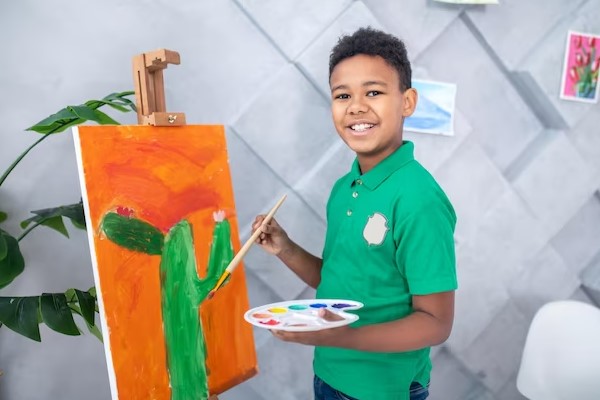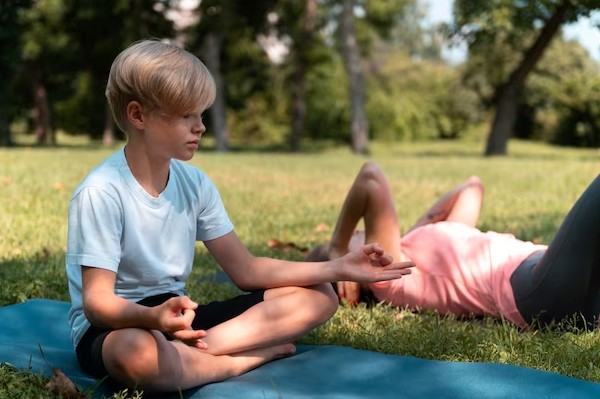Anxiety affects millions of children every year, but what if you could combat this by leveraging natural remedies for anxiety in children? Anxiety is not just a passing phase or a rite of passage. It’s a serious condition that can cast a long, oppressive shadow over a child’s mental health.
In this light, it’s important for parents and caregivers to understand that they are not powerless. With an informed approach, you can introduce effective, natural strategies to soothe your child’s anxiety and improve their overall mental well-being. Prepare to navigate the often tumultuous waters of childhood anxiety with confidence and compassion.
1. Mindfulness and Meditation – The Power of the Present
Meditation and mindfulness exercises stand out as valuable tools for promoting mental health in children. These practices train the mind to focus on the present moment, effectively helping children manage their anxious thoughts.
Mindfulness doesn’t have to be complicated. Simple activities such as focused breathing or sensory games can introduce your child to the concept. Guided meditations designed for children are also available on various platforms.
2. Regular Exercise and Yoga – Unleashing the Natural Calm
Regular physical activity can significantly improve your child’s mental health. Exercise releases endorphins, the body’s natural mood boosters. These chemicals help children feel happier and more relaxed.
Introducing your child to yoga offers dual benefits. Besides promoting physical health, yoga also encourages mindfulness. The combination of postures, breathing exercises, and meditation in yoga provides a holistic approach to managing anxiety.
From playing catch in the backyard to enrolling your child in a dance class, there are countless ways to get them moving. Try to incorporate a variety of activities to keep things fun and engaging.
3. Healthy Diet – Food for the Mind
Just as it affects physical health, diet can influence a child with anxiety. Certain foods have been linked to improving brain health and reducing anxiety symptoms. These include foods rich in omega-3 fatty acids, such as fish and walnuts, and foods high in vitamin B like whole grains and lean meats.
Limiting the intake of processed foods, which often contain high amounts of sugar and artificial ingredients, can also be beneficial. Excessive sugar consumption, for instance, can lead to energy spikes and crashes, potentially exacerbating feelings of anxiety.
Keep in mind that a healthy diet should not be about restriction, but balance and variety. Involve your child in meal planning and preparation to make healthy eating more appealing.
4. Aromatherapy – Scents of Serenity
Aromatherapy, the use of aromatic plant extracts and essential oils, can be a tool for stress management. Certain scents, like lavender, have been found to promote relaxation and reduce anxiety.
Introduce aromatherapy in your child’s routine through various methods. A drop of essential oil in a warm bath, a diffuser in their room, or even a lavender-infused pillow can make a difference.
However, always ensure that the chosen oils are safe for children and used in the right amounts. Each oil comes with its own set of precautions, so it’s advisable to do some research or consult a professional before starting.
5. Herbal Remedies – Nature’s Little Helpers
Some parents find herbal remedies helpful for a child with anxiety. Plants such as chamomile and lemon balm are often used because they can have a calming effect.
Chamomile, in the form of a warm tea, is known for its soothing qualities. Lemon balm, often mixed with other calming herbs like lavender, can also be used in tea. These herbal teas can become a comforting part of a bedtime routine.
It’s important to use these herbs safely. Always consult a health professional before introducing herbal remedies to your child’s routine.
6. Art Therapy – Expressing the Unexpressed
Art therapy can be a helpful way to improve mental wellness. It gives children a creative outlet to express feelings they might struggle to put into words.

Painting, drawing, sculpting, or even just coloring can be therapeutic. It’s not about creating a masterpiece, but rather about the process of creating. This process allows children to explore their feelings and cope with anxiety.
Try to create a calm and inviting space where your child feels free to express themselves through art. Provide them with a variety of materials to experiment with.
7. Quality Sleep – The Underrated Healer
The importance of quality sleep in managing anxiety cannot be overstated. Adequate sleep has a direct impact on a child’s mood, ability to focus, and overall mental well-being. On the other hand, insufficient sleep can heighten feelings of anxiety and make it more difficult for a child to manage stress.
Creating a conducive sleep environment is the first step. The room should be quiet, dark, and cool, and the bed comfortable.
If your child is sensitive to sound, consider using a white noise machine. An eye mask could be helpful if the room can’t be dark enough.
Maintaining a consistent sleep schedule, even on weekends, promotes a stable sleep pattern and makes it easier for your child to fall asleep and wake up. This routine should ideally include winding-down time, allowing the body to transition from the busyness of the day to a calmer state conducive to sleep.
The bedtime routine can include various calming activities. Reading a book together can serve as a comforting bonding time, while also relaxing the mind. Gentle stretching or yoga can help release physical tension.
If your child struggles with worrisome thoughts at night, teaching them calming breathing exercises or visualization techniques can provide tools to settle their mind. Avoid electronic devices the hour before bed. The light from these screens can interfere with the body’s natural sleep-wake cycle, making it harder to fall asleep.
Learn More Natural Remedies for Anxiety in Children
Helping a child with anxiety doesn’t always require a medical approach. Emphasizing a balanced lifestyle, encouraging mindfulness, and ensuring a nurturing environment are all part of the natural remedies for anxiety in children. These strategies can substantially improve your child’s mental health and lay the foundation for a happier, more tranquil life. Remember, as a parent, your support and understanding play a pivotal role in their journey. So let’s commit to a mentally healthier generation, starting with our children.
Visit our Health and Fitness section for more practical advice on nurturing a healthier and happier family life.




